印度之行
印度之行
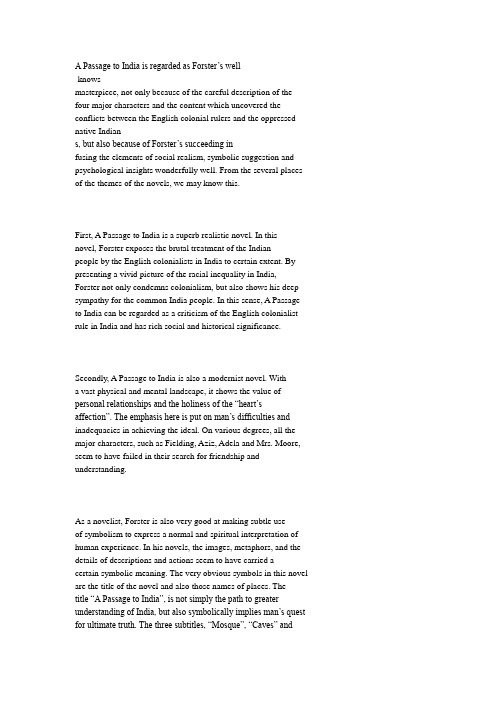
A Passage to India is regarded as Forster’s well-knowsmasterpiece, not only because of the careful description of the four major characters and the content which uncovered the conflicts between the English colonial rulers and the oppressed native Indians, but also because of Forster’s succeeding infusing the elements of social realism, symbolic suggestion and psychological insights wonderfully well. From the several places of the themes of the novels, we may know this.First, A Passage to India is a superb realistic novel. In this novel, Forster exposes the brutal treatment of the Indianpeople by the English colonialists in India to certain extent. By presenting a vivid picture of the racial inequality in India, Forster not only condemns colonialism, but also shows his deep sympathy for the common India people. In this sense, A Passage to India can be regarded as a criticism of the English colonialist rule in India and has rich social and historical significance.Secondly, A Passage to India is also a modernist novel. Witha vast physical and mental landscape, it shows the value of personal relationships and the holiness of the “heart’s affection”. The emphasis here is put on man’s difficulties and inadequacies in achieving the ideal. On various degrees, all the major characters, such as Fielding, Aziz, Adela and Mrs. Moore, seem to have failed in their search for friendship and understanding.As a novelist, Forster is also very good at making subtle useof symbolism to express a normal and spiritual interpretation of human experience. In his novels, the images, metaphors, and the details of descriptions and actions seem to have carried acertain symbolic meaning. The very obvious symbols in this novel are the title of the novel and also those names of places. Thetitle “A Passage to India”, is not simply the path to greater understanding of India, but also symbolically implies man’s quest for ultimate truth. The three subtitles, “Mosque”, “Caves” and“Te mple”, symbolically suggest that various religious paths totruth are being problematically offered. In the first part, the meeting of Dr. Aziz and Mrs. Moore at the mosque implies the possible achievement in personal relations by means of intuitive sympathy, acceptance and warmth. In correspondence with the theme in this part, the cool weather implies a kind of sanity and control over the human behavior. But the abortive “bridge party”, the rudely interrupted tea party, the broken and patched engagement of Adela and Ronny and the coming of the hot weather all pose a threat to the frail human bond.In the second part, the shattering experience of Adelaand Mrs.Moore in the Marabar Caves is the central episode. Adela’s accusation of Aziz’s insulting her destroysMrs. Mooreboth spiritually and physically, and drives Adela to the brink of madness. It threatens ruin to Aziz and destroys all constructive relationships among the four persons. Suspicion, hostility and hatred between the Englishmen and the Indians are aroused to the full when the stormy trial comes. Symbolically, the caves stand for the voice of chaos and provide a negative answer to the human endeavor for understanding and friendship. In this part, the hot weather, dangerous and oppressive to all life, echoes the negative answer to the caves with hallucination and hysteria, which annihilates all reason and justice.In the third part, the festival to celebrate the birth ofIndian love goddess in rainy season opens the“Temple”section.Usually temple is the place where Hindu religion celebrates the birth of love goddess, and where curls up holy incense smoke. But after the celebration, when Aziz and Fielding rides out of the mountain valley, the temples, the tank, the jail, the palace, even the birds and the carrion, what seem to be an ill omen, sayin their hundred voices: that they don’t want to be friends. So“Temple”is not only the symbol of the Hindu religion, and alsothat of a magic universe to which an answer to possible reconciliation of human relations might exist, and rain, symbolof renewed life or regeneration, also implies a hope of future friendship between England and India. The organic combination of the natural climate, the atmosphere of the story and the characters’feeling also displays the excellent skills in using the symbolism technique.4 ConclusionWhile presenting a realistic picture in his works, Forsteraims to convey his moral message in various symbols. But he does not always succeed in harmonizing realism and symbolism. As his stories shift from one to the other, now and again the readerfeels ajar. The symbolic episode is too improbable for thereader to maintain his illusion of everyday reality. The demandsof his symbolic pattern also lead Forster astray by making himgo outside his creative range. But his A Passage to India also can be regarded as a masterpiece in the English literature world.References:[1]Forster, E. M. A Passage to India[M]. New York:Harcourt’ Brace, 1984.[2]S.M.Gilbert. E.M.Forster’s A Passage to India and Howards End[M].Beijing Foreign Language Teaching and Research Press, 1996.[3]金光兰.《印度之行》的象征意蕴[J].兰州大学学报(社会科学版)2002, (02).[4]张伯香.英国文学教程[M].武汉:武汉大学出版社,1997.[5]张秀芝.迷人的梦幻与失望的悲凉–福斯特《印度之行》解读[J].西安外国语学院学报,2006, (01).。
浅谈福斯特《印度之行》的艺术手法
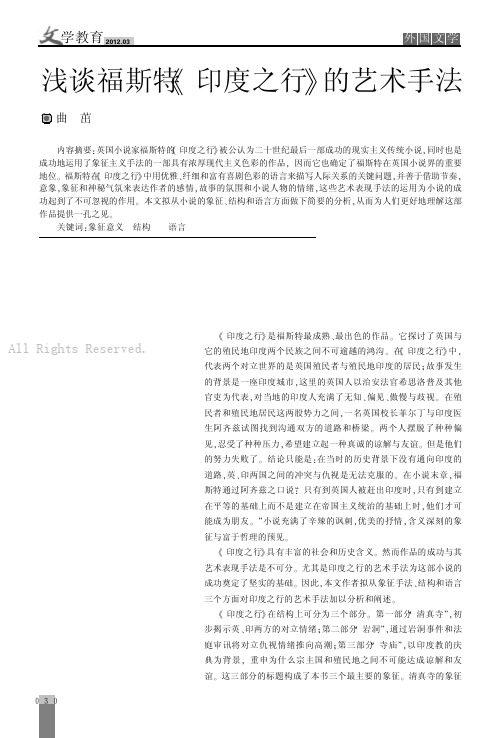
《印度之行》是福斯特最成熟、最出色的作品。
它探讨了英国与它的殖民地印度两个民族之间不可逾越的鸿沟。
在《印度之行》中,代表两个对立世界的是英国殖民者与殖民地印度的居民;故事发生的背景是一座印度城市,这里的英国人以治安法官希思洛普及其他官吏为代表,对当地的印度人充满了无知、偏见、傲慢与歧视。
在殖民者和殖民地居民这两股势力之间,一名英国校长菲尔丁与印度医生阿齐兹试图找到沟通双方的道路和桥梁。
两个人摆脱了种种偏见,忍受了种种压力,希望建立起一种真诚的谅解与友谊。
但是他们的努力失败了。
结论只能是:在当时的历史背景下没有通向印度的道路,英、印两国之间的冲突与仇视是无法克服的。
在小说末章,福斯特通过阿齐兹之口说:“只有到英国人被赶出印度时,只有到建立在平等的基础上而不是建立在帝国主义统治的基础上时,他们才可能成为朋友。
”小说充满了辛辣的讽刺,优美的抒情,含义深刻的象征与富于哲理的预见。
《印度之行》具有丰富的社会和历史含义。
然而作品的成功与其艺术表现手法是不可分。
尤其是印度之行的艺术手法为这部小说的成功奠定了坚实的基础。
因此,本文作者拟从象征手法、结构和语言三个方面对印度之行的艺术手法加以分析和阐述。
《印度之行》在结构上可分为三个部分。
第一部分“清真寺”,初步揭示英、印两方的对立情绪;第二部分“岩洞”,通过岩洞事件和法庭审讯将对立仇视情绪推向高潮;第三部分“寺庙”,以印度教的庆典为背景,重申为什么宗主国和殖民地之间不可能达成谅解和友谊。
这三部分的标题构成了本书三个最主要的象征。
清真寺的象征内容摘要:英国小说家福斯特的《印度之行》被公认为二十世纪最后一部成功的现实主义传统小说,同时也是成功地运用了象征主义手法的一部具有浓厚现代主义色彩的作品,因而它也确定了福斯特在英国小说界的重要地位。
福斯特在《印度之行》中用优雅、纤细和富有喜剧色彩的语言来描写人际关系的关键问题,并善于借助节奏,意象,象征和神秘气氛来表达作者的感情,故事的氛围和小说人物的情绪,这些艺术表现手法的运用为小说的成功起到了不可忽视的作用。
“印度之行”通往何方?——解读《印度之行》中“自我”的悖论

论, 透视 想“ 看真 正 的印度”的中心人 物 阿德拉 的 印度之 行 , 面 上是 寻 找 “ 者”, 质 上是 探 求 “自 看 表 他 实
义 。前 者构 建 落 后 、 落 、 恶 和 暴 力 的 东 方 形 堕 邪 象 , 为西方 殖 民 主义意 识形 态 的投射 ; 者却 将 成 后
n ait st e s l n h nd a o o a e pl s t e oh r s . F o t e p rp ci e o e s l n e ilssa h e fa d t e I in c lnilp o e a h t e ne s r m h e s e tv ft ef a d t h h
t e s l.F rtrc nsr c s I d a a h t e e sfo t e p rpe t e o e g e tta iin o it h h ma i h ef o se o tu t n i s te o m s r m e s ci ft r a r d t fBr i u n — h h v h o s
I di n a
Ab t a t A Pas g o I d a h sb e s r ic f e e l g t e r l t n h p ew e h r ih c l — sr c : s a e t n i a e n a ma t p e e o v ai h ea i s i s b t e n t e B t o o e r n o i s
o en s,A eaQ et Sq eto n es n ig f eo e s i esni l aq et r n es n ig f t res d l u s d’ u s f u d r a d t mes s s t l u s f drt dn h e r t n ot h h e ay u o a o
《印度之行》中英文字幕翻译原文
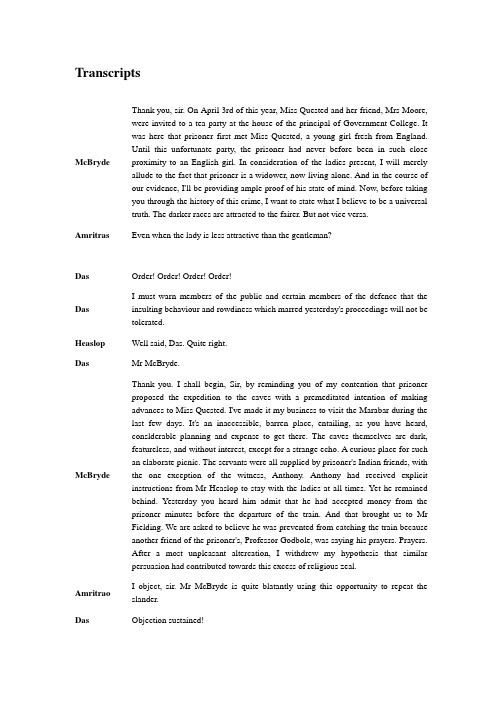
TranscriptsMcBryde Thank you, sir. On April 3rd of this year, Miss Quested and her friend, Mrs Moore, were invited to a tea party at the house of the principal of Government College. It was here that prisoner first met Miss Quested, a young girl fresh from England. Until this unfortunate party, the prisoner had never before been in such close proximity to an English girl. In consideration of the ladies present, I will merely allude to the fact that prisoner is a widower, now living alone. And in the course of our evidence, I'll be providing ample proof of his state of mind. Now, before taking you through the history of this crime, I want to state what I believe to be a universal truth. The darker races are attracted to the fairer. But not vice versa.Amritras Even when the lady is less attractive than the gentleman? Das Order! Order! Order! Order!Das I must warn members of the public and certain members of the defence that the insulting behaviour and rowdiness which marred yesterday's proceedings will not be tolerated.Heaslop Well said, Das. Quite right. Das Mr McBryde.McBryde Thank you. I shall begin, Sir, by reminding you of my contention that prisoner proposed the expedition to the caves with a premeditated intention of making advances to Miss Quested. I've made it my business to visit the Marabar during the last few days. It's an inaccessible, barren place, entailing, as you have heard, conslderable planning and expense to get there. The caves themselves are dark, featureless, and without interest, except for a strange echo. A curious place for such an elaborate picnic. The servants were all supplied by prisoner's Indian friends, with the one exception of the witness, Anthony. Anthony had received explicit instructions from Mr Heaslop to stay with the ladies at all times. Yet he remained behind. Yesterday you heard him admit that he had accepted money from the prisoner minutes before the departure of the train. And that brought us to Mr Fielding. We are asked to believe he was prevented from catching the train because another friend of the prisoner's, Professor Godbole, was saying his prayers. Prayers. After a most unpleasant altercation, I withdrew my hypothesis that similar persuasion had contributed towards this excess of religious zeal.Amritrao I object, sir. Mr McBryde is quite blatantly using this opportunity to repeat the slander.Das Objection sustained!MahmoudAliHa!(laughter in court) Das Order! Order! Order!McBryde Prisoner had yet to rid himself of a third impediment. The lady in question suffered from what is known in medical parlance as 'claustrophobia'. Prisoner achieved his objective by entering the first cave with Miss Quested and the guide, leaving this elderly lady in the rear, where she was crushed and crowded by servants and villagers.Dr Aziz Mrs Moore. He's speaking of Mrs Moore! Das Quiet.Mahmoud Ali Are you accusing my client of attempted murder as well as rape? Now who is this lady he's talking about? I don't understand.Dr Aziz The lady I met in the mosque. Mrs Moore.MahmoudAliMrs Moore? You speak of Mrs Moore? McBryde I don't propose to call her.Mahmoud Ali You don't propose to call her because you can't! She was smuggled out of the country because she was on our side. She would have proved his innocence.Das You could have called her yourself. Neither side called her, neither may quote her as evidence.Mahmoud Ali But she was kept from us! This is English justice? This is your British Raj? Just give us back Mrs Moore for five minutes.Heaslop If the point is of any interest, my mother should be reaching Aden at noon today, their time.MahmoudAliBanished by you!Das Please, please. This is no way to defend your case.MahmoudAliI'm not defending a case. And you are not trying one. We are both slaves! Das Mr Mahmoud Ali, unless you sit down, I shall have to exercise my authority. MahmoudAliDo so! This trial is a farce! I'm going! I ruin my career!Dr Aziz Mrs Moore! Where are you, Mrs Moore?MahmoudAliWe want Mrs Moore! Mrs Moore! Mrs Moore! Das Order! Order!MahmoudAliFarewell, my friend. They have taken Mrs Moore!MahmoudAliMrs Moore! Mrs Moore!crowd Mrs Moore! Mrs Moore!MahmoudAliMrs Moore! Mrs Moore!(crowd chanting)MissQuestedIsn't it strange? Rather wonderful.Heaslop I knew they'd try something like this.Das Quiet, please.Heaslop Poor old Das.Das Quiet! Order!Amritrao I apologise for my colleague. He's an intimate friend of our client, and his feelings have carried him away.Das Mr Mahmoud Ali will have to apologise in person. Amritrao Exactly, sir, he must.Das I must repeat that, as a witness, Mrs Moore does not exist. Neither you, Mr Amritrao, nor Mr McBryde, you, have any right to surmise what that lady would have said. She is not here and, consequently, she can say nothing.Officer Thou knowest, Lord, the secrets of our hearts. Shut not thy merciful ears to our prayer. We therefore commit her body to the deep to be turned into corruption. Looking for the resurrection of the body, when the sea shall give up her dead. I heard a voice from heaven saying unto me: 'Blessed are the dead, which die in the Lord.'crowd (chanting) Mrs Moore! Mrs Moore! McBryde I now call upon Miss Quested.CourtOfficialPlace your hand on the book...MissQuested...and nothing but the truth. Das Quiet, please. Silence!McBryde Now, Miss Quested... I would like to take you back to the moment when you came out of that first cave and found Mrs Moore collapsed in her chair. Are you with me?MissQuestedYes.McBryde Did she offer any explanation?MissQuestedErr.. she said she was upset by the echo and that she was tired.McBryde And taking advantage of her distress and fatigue, prisoner instructed the villagers and servants to remain behind, and took you off alone with the guide.MissQuestedYes. But it was at Mrs Moore's suggestion.McBryde I don't quite follow.MissQuestedShe'd been worried by the crowd and the stuffiness.McBryde And was concerned that you might be subjected to the same ordeal. MissQuestedNo. She wanted us to enjoy ourselves. She said so. She likes Dr Aziz.McBryde Yes, I think I understand the situation. Yesterday, Mr Fielding sald that Mrs Moore was what he described as 'charmed' by him.MissQuestedIt was more than that. She liked him.McBryde Nevertheless, you'd only met him on two occasions before the day of the crime. MissQuestedYes.McBryde So it might possibly have been a rather impetuous assessment.MissQuestedPossibly. She's like that.McBryde Miss Quested, you heard this morning the slur cast on British justice by the defence.It is most important that you tell the court the absolute truth of what took place,painful as it may be.MissQuestedI was brought up to tell the truth.McBryde Of course.MissQuestedI'm sorry.McBryde That's quite all right. Now, Miss Quested, you went off up the slope with the prisoner and the guide.MissQuestedYes.McBryde Take your time and cast your mind back. Miss Quested? McBryde Miss Quested, we were going up the slope. Is something wrong? MissQuestedI think it may have partly been my fault.McBryde Why?Miss Quested We'd stopped to look out over the plain. I could hardly see Chandrapore except through Mr Heaslop's binoculars. I asked Dr Aziz if he loved his wife when he married her. I shouldn't have done that.Das Then why did you do it?Miss Quested I was thinking of my own marriage. Mr Heaslop and I had only just become engaged. Seeing Chandrapore so far away, I realised I didn't love him.(murmuring in court)Das Quiet, please. Quiet.McBryde Miss Quested, you and the prisoner continued up to the caves?MissQuestedYes.McBryde Where was the guide?MissQuestedHe'd gone on ahead.McBryde Sent on ahead?Miss No, he was waiting for us further along the ledge.QuestedMcBryde But when you reached the caves, prisoner left you and went to speak to the guide? MissI don't know if he spoke to him or not.QuestedMcBryde He left you and went off in his direction.MissYes.QuestedMcBryde And what did you do?MissI waited.QuestedDas You said just now 'I think it may have been partly my fault.' Why?MissI had asked him about love.QuestedDas And had thereby introduced a feeling of intimacy?MissThat is what I meant.QuestedDas Thank you. Mr McBryde.McBryde Please tell the court exactly what happened.MissI lit a match.QuestedDr Aziz Miss Quested! Miss Quested! Miss Quested?McBryde And the prisoner followed you.(rumble)McBryde Miss Quested, the prisoner followed you, didn't he?MissCould I please have a minute before I reply to that, Mr McBryde?QuestedMcBryde Certainly.MissI'm... I'm not quite sure.Quested(murmuring)McBryde I beg your pardon? You are in the cave, and the prisoner followed you. What do youmean, please?MissQuestedNo.Das What is that? What are you saying? MissQuestedI'm afraid I've made a mistake.Das What nature of mistake?MissQuestedDr Aziz never followed me into the cave.(louder murmuring)McBryde Now Miss Quested, let us go on. I will read you the deposition which you signed when you arrived back with Mrs Callendar.Das Mr McBryde, you cannot go on. I was speaking to the witness. And the public will be silent! Miss Quested, address your remarks to me. And remember - you speak on oath, Miss Quested.MissQuestedDr Aziz...Callendar I stop these proceedings on medical grounds!Das Quiet! Please, sit down! You withdraw the accusation, Miss Quested? Answer me. MissQuestedI withdraw everything.Das Order! Order! The prisoner is released without one stain on his character! Hamidullah Dr Aziz is free!麦拜迪: 谢谢,法官大人。
印度之行

电影经典对白
• 登记员:头回去印度,奎斯特小姐? 奎斯特:头一回出国。 登记员:真幸运!开眼界啊。那是马拉巴山洞。离你们去的昌德拉布 二十英里。 • 奎斯特:是吗? • 登记员:莫尔太太五月十二日乘拉瓦尔品帝号回国。你的日期还没定, 对不对? • 奎斯特:我可能要住一阵子。 • 登记员:要是你决定一起回国,请尽快通知我们。 • 奎斯特:好的。 • 登记员:好,这是标签,你的票,莫尔太太的票。你们路上不会腻味 的。总督大人这回也乘这条船。 • 希斯洛普:你好,母亲。阿德勒呢? • 奎斯特:这儿。 • 希斯洛普:你果真来了。 • 希斯洛普:安东尼,去拿行李。把行李交给安东尼吧。对不起,我 得……我得去迎接市长大人。对不起,让你们久等了。可那是个大人 物啊。
•
在一个炎热憋闷的日子,阿齐兹医生带领一支探险队来 到马拉巴山洞,队员们一个接一个地放弃了,只有阿黛拉 小姐留下了。接着,这两个人,一个印度男人和一个英国 女人在最后一段路途上同行。在当时,英国对印度的统治 根植于一种根深蒂固的、半官方的种族主义之上,一些英 国对吉卜林的话深信不疑:“东方就是东方,西方就是西 方,它们永远不可能相交。”在福斯特的小说中,当阿黛 拉小姐走进山洞后,她和阿齐兹医生之间到底发生了什么, 始终都不甚清晰。
A Passage to India
印度之行
•
• • • • • • • • • • • •
《印度之行》是英国著名作家 福斯特的代表作。二十世纪 初,英国人穆尔夫人和阿德 拉小姐前往印度,一个看望 在那里任殖民官的儿子,另 一个则是看望这位末婚夫 印度穆斯林医生阿齐兹出于 热情和友谊,组织了不少人 陪同两位客人前往当地名胜 马拉巴山洞游览。在幽暗的 山洞里,阿德拉小姐感觉似 乎有人侮辱了她,于是掀起 了一场轩然大波。
浅析《印度之行》中的追寻主题
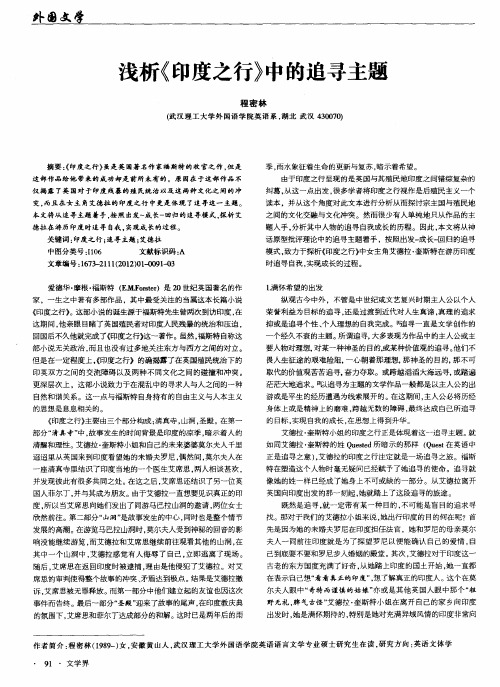
浅析《 印度之行》 中的追寻主题 ห้องสมุดไป่ตู้
程密 林
( 武汉理工大学外国语学院英语系 , 湖北 武汉 4 0 7 ) 3 0 0
摘要 :印度之 行 》 《 虽是 英 国著 名作 家福 斯 特 的收 官之 作 , 是 但
这 部作 品给 他 带来 的成 功却 是 前所 未有 的 。原 因在 于这 部 作品 不
本 文将 从 追寻 主题 着手 。 照 出发一 长一 按 成 回归的 追寻模 式 . 析 艾 探 德 拉在 游 历印度 时 追寻 自我 , 实现成 长 的过程 。 关键 词 : 印度 之行 : 寻主题 : 追 艾德拉 中图分类 号 : 0 I6 1 文 献标 识码 : A
题人手 , 分析其中人物的追寻自我成长的历程 。因此 , 本文将从神
仅 揭露 了英 国对 于印度 残 暴的 殖 民统 治以及 这 两种 文化 之 间 的冲 突. 而且在 女 主 角艾德 拉 的 印度 之 行 中更是 体现 了追 寻这 一主题 。
季, 雨水 象征着 生命 的更 新与 复苏 , 暗示 着希 望 。
由于印 度之 行呈 现 的是 英 国与其 殖 民地 印度 之间 错综 复 杂 的 纠葛 , 这 一点 出发 , 多学 者将 印度 之 行视 作是 后殖 民 主义 一个 从 很 读本 ,并从 这个 角度 对 此文 本进 行分 析 从而 探讨 宗主 国 与殖 民地 之 间的 文化 交融 与文 化 冲突 。然 而很 少 有人 单纯 地 只从 作 品的 主
的思想 是 息息 相关 的 。
《 印度 之行 》 要 由三个部 分构 成 : 真寺 , 洞 , 主 清 山 圣殿 。 第一 在
部分“ 清真 寺” , 中 故事 发生 的 时 间背景 是 印度 的凉 季 , 示 着人 的 暗
印度之行

自由 平等和人道精神
Freedom, equality and the spirit of humanity
Trying to get free from the constraints of society and customs.
试图通过挣脱社会与习俗的约束来求得个人解放
Forster was born in a family of architects in London.Father died early. When he was young studying in school,he didn't have a pleasant experience.In1897 foster entered Cambridge University and joined The Apostle. After graduating from university ,foster travel to Italy and Greece, intoxicated with the alien culture there,which deepen his dissatisfaction to British social order.The second time Forster went to India.This travel made Forster witnessed the ugly of British colonial rule.
福斯特《印度之行》主要内容概要及赏析
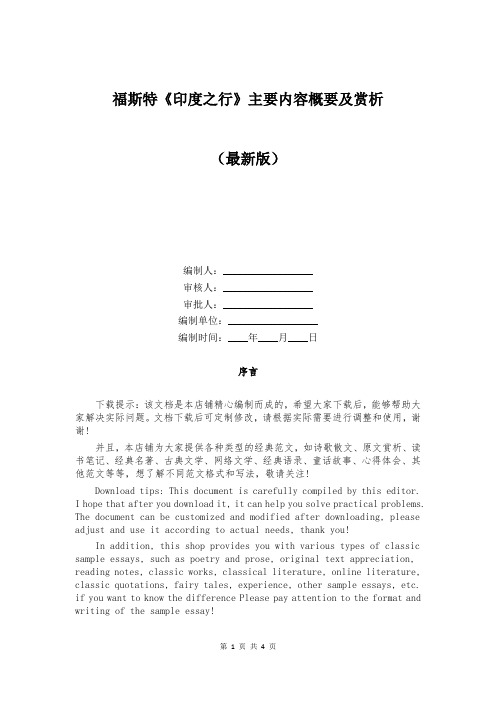
福斯特《印度之行》主要内容概要及赏析(最新版)编制人:__________________审核人:__________________审批人:__________________编制单位:__________________编制时间:____年____月____日序言下载提示:该文档是本店铺精心编制而成的,希望大家下载后,能够帮助大家解决实际问题。
文档下载后可定制修改,请根据实际需要进行调整和使用,谢谢!并且,本店铺为大家提供各种类型的经典范文,如诗歌散文、原文赏析、读书笔记、经典名著、古典文学、网络文学、经典语录、童话故事、心得体会、其他范文等等,想了解不同范文格式和写法,敬请关注!Download tips: This document is carefully compiled by this editor.I hope that after you download it, it can help you solve practical problems. The document can be customized and modified after downloading, please adjust and use it according to actual needs, thank you!In addition, this shop provides you with various types of classic sample essays, such as poetry and prose, original text appreciation, reading notes, classic works, classical literature, online literature, classic quotations, fairy tales, experience, other sample essays, etc. if you want to know the difference Please pay attention to the format and writing of the sample essay!福斯特《印度之行》主要内容概要及赏析【导语】:《印度之行》外国文学作品简析英国小说家福斯特(18791970)的长篇小说。
- 1、下载文档前请自行甄别文档内容的完整性,平台不提供额外的编辑、内容补充、找答案等附加服务。
- 2、"仅部分预览"的文档,不可在线预览部分如存在完整性等问题,可反馈申请退款(可完整预览的文档不适用该条件!)。
- 3、如文档侵犯您的权益,请联系客服反馈,我们会尽快为您处理(人工客服工作时间:9:00-18:30)。
印度之行(A Passage to India)简介:
A Passage to India (1924) is a novel by E. M. Forster set against the backdrop of the British Raj and the Indian independence movement in the 1920s. It was selected as one of the 100 great works of English literature by the Modern Library and won the 1924 James Tait Black Memorial Prize for fiction. Time magazine included the novel in its "TIME 100 Best English-language Novels from 1923 to 2005".
The story revolves around four characters: Dr. Aziz, his British friend Cyril Fielding, Mrs. Moore, and Adela Quested. During a trip to the Marabar Caves, Adela accuses Aziz of attempting to rape her. Aziz's trial, and its run-up and aftermath, bring out all the racial tensions and prejudices between indigenous Indians and the British colonists who rule India. In A Passage to India, Forster employs his first-hand knowledge of India.
本书是英国著名作家福斯特的代表作。
二十世纪初,英国人穆尔夫人和阿德拉小姐前往印度,一个看望在那里任殖民官的儿子,另一个则是看望这位未婚夫。
印度穆斯林医生阿齐兹出于热情和友谊,组织了不少人陪同两位客人前往当地名胜马拉巴山洞游览。
在幽暗的山洞里,阿德拉小姐感觉似乎有人侮辱了她,于是掀起了一场轩然大波……
莫尔太太和阿黛拉·奎斯蒂德小姐结伴来到印度的小城昌德拉布尔,探望担任殖民地官员的儿子和未婚夫,她们很快就感觉到陷入那与世隔绝并充满偏见的英印社会当中,为了能探索“真实的印度”,她们跟当地的一位印度穆斯林医生阿齐兹成为朋友,并在对方的热情邀请下同游郊外的名胜马拉巴尔石窟。
在精神恍惚间,阿黛拉感觉受到了阿齐兹的攻击,由此引发了一场轩然大波,英国统治者与印度民众之间的矛盾空前尖锐,双方成为针锋相对的两个敌对阵营。
当地公立学校的校长塞西尔·菲尔丁公开站到了为阿齐兹辩护的阵营,在庭审过程中逐渐认清真相的阿黛拉也勇敢地承认了自己的错误,终于洗脱了阿齐兹的不白之冤。
《印度之行》是福斯特最后一部长篇小说,也被公认为作者最优秀的文学成就;小说不但深刻地揭示和批判了种族主义和殖民主义,更脱出政治与民族的窠臼,力图指明人类在一个至今尚不为我们的头脑所理解的宇宙中生存的困境,致力于探索整个人类何以自处、共存与救赎的终极道路。
小说极富象征意味与哲理深度,既引人入胜又诗意盎然,被公认为二十世纪最伟大的文学巨著之一。
E·M·福斯特(Edward Morgan Forster,1879—1970),英国著名小说家、散文家和批评家,著名的人道主义者,毕业于剑桥大学国王学院,后被母校聘为荣誉研究员。
第一部清真寺第一章至第十一章
第二部石窟第十二章至第三十七章
附录Ⅰ福斯特为“人人版”所写的短序(1957)
附录Ⅱ福斯特为桑塔•拉玛•劳的戏剧版所写的附注
附录Ⅲ“人人版”彼得•伯拉导言
莫尔太太和阿黛拉·奎斯蒂德小姐结伴来到印度的小城昌德拉布尔,探望担任殖民地官员的儿子和未婚夫,她们很快就感觉到陷入那与世隔绝并充满偏见的英印社会当中,为了能探索“真实的印度”,她们跟当地的一位印度穆斯林医生阿齐兹成为朋友,并在对方的热情邀请下同游郊外的名胜马拉巴尔石窟。
在精神恍惚间,阿黛拉感觉受到了阿齐兹的攻击,由此引发了一场轩然大波,英国统治者与印度民众之间的矛盾空前尖锐,双方成为针锋相对的两个敌对阵营。
当地公立学校的校长塞西尔·菲尔丁公开站到了为阿齐兹辩护的阵营,在庭审过程中逐渐认清真相的阿黛拉也勇敢地承认了自己的错误,终于洗脱了阿齐兹的不白之冤。
《印度之行》是福斯特最后一部长篇小说,也被公认为作者最优秀的文学成就;小说不但深刻地揭示和批判了种族主义和殖民主义,更脱出政治与民族的窠臼,力图指明人类在一个至今尚不为我们的头脑所理解的宇宙中生存的困境,致力于探索整个人类何以自处、共存与救赎的终极道路。
小说极富象征意味与哲理深度,既引人入胜又诗意盎然,被公认为二十世纪最伟大的文学巨著之一。
E·M·福斯特(Edward Morgan Forster,1879—1970),英国著名小说家、散文家和批评家,著名的人道主义者,毕业于剑桥大学国王学院,后被母校聘为荣誉研究员。
主要作品有长篇小说《天使不敢涉足的地方》(1905)、《最漫长的旅程》(1907)、《看得见风景的房间》(1908)、《霍华德庄园》(1910)、《莫瑞斯》(创作于1913—1914年,1971年作者逝世后出版)、《印度之行》(1924);两部短篇小说集《天国公共马车》(1911)和《永恒的瞬间》(1928),后合为《福斯特短篇小说集》(1947);以及广受好评的小说评论专著《小说面面观》(1927,原为在剑桥大学的系列演讲)。
福斯特作为小说家的力量主要体现在他将各种典型性格人格化的高超能力、他对于人性中卑鄙与高贵间激烈斗争的出色描绘、他所塑造的一系列令人难忘的“圆形人物”以及极具个人色彩的明晰风格。
作为著名人道主义者的福斯特在作品中高举“理解”与“同情”的大旗,强调精神与物质之间、人与人乃至不同的民族之间“只有连接起来”,人类才有希望。
福斯特的小说具有强烈的社会批判意义,饱含幽默和反讽,既有精巧严整的情节,又极富象征乃至哲理意味,将艺术性与可读性完美地融为一体。
福斯特曾十三次被提名为诺贝尔文学奖候选人,并有五部小说作品被改编为电影;他不但被公认为二十世纪最伟大的小说家之一,同时又是拥有最大读者群的作家之一。
作者简介
E·M·福斯特(Edward Morgan Forster,1879—1970),英国著名小说家、散文家和批评家,著名的人道主义者,毕业于剑桥大学国王学院,后被母校聘为荣誉研究员。
E·M·福斯特(Edward Morgan Forster,1879—1970),英国著名小说家、散文家和批评家,著名的人道主义者,毕业于剑桥大学国王学院,后被母校聘为荣誉研究员。
主要作品有长篇小说《天使不敢涉足的地方》(1905)、《最漫长的旅程》(1907)、《看得见风景的房间》(1908)、《霍华德庄园》(1910)、《莫瑞斯》(创作于1913—1914年,1971年作者逝世后出版)、《印度之行》(1924);两部短篇小说集《天国公共马车》(1911)和《永恒的瞬间》(1928),后合为《福斯特短篇小说集》(1947);以及广受好评的小说评论专著《小说面面观》(1927,原为在剑桥大学的系列演讲)。
福斯特作为小说家的力量主要体现在他将各种典型性格人格化的高超能力、他对于人性中卑鄙与高贵间激烈斗争的出色描绘、他所塑造的一系列令人难忘的“圆形人物”以及极具个人色彩的明晰风格。
作为著名人道主义者的福斯特在作品中高举“理解”与“同情”的大旗,强调精神与物质之间、人与人乃至不同的民族之间“只有连接起来”,人类才有希望。
